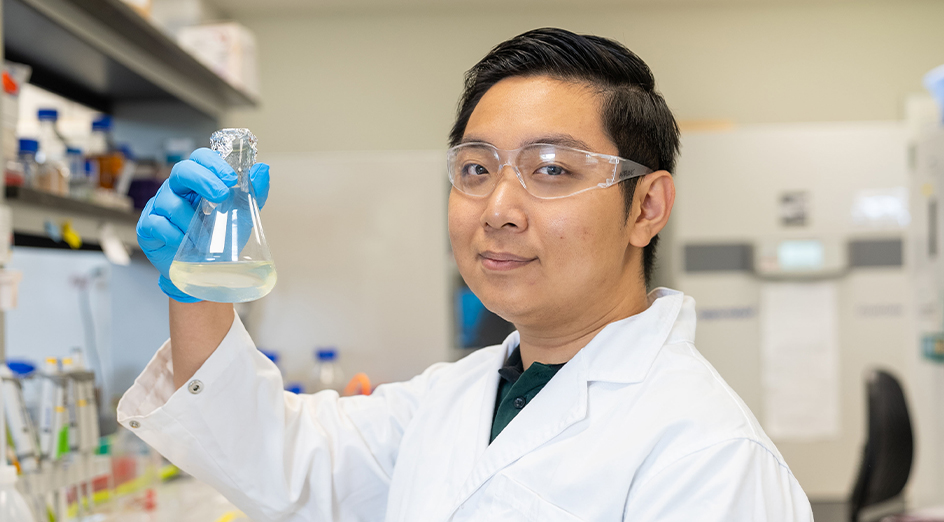A PhD student from The University of Western Australia is working with industry to help tackle climate change and plastic pollution by transforming carbon dioxide emissions into biodegradable materials.
Roland Politan completed a bachelor’s degree in molecular genetics and biotechnology and honours in biogeochemistry at Curtin University.
Inspired by UWA’s connection to industry as well as the picturesque Crawley campus he transferred to embark on a PhD in synthetic biology.
Mr Politan works in the CO2 Foundry, an Australian Research Council project where chemists and biochemists from UWA’s School of Molecular Sciences work in collaboration with Woodside Energy to convert CO2 emissions into bioproducts.
He is part of a research team working on a carbon capture project that aims to convert carbon dioxide into bioplastics.
“Reducing carbon footprints has a direct impact in the community and is a global issue,” Mr Politan said.
 Image: Roland Politan.
Image: Roland Politan.
“I come from Jakarta, Indonesia, one of the most polluted cities in the world and finding out that there is a project that can convert carbon dioxide into a product intrigued me and is close to my heart.”
The innovative project converts CO2, a small chain of carbon, into a longer chain of carbon to create biodegradable plastic that have the potential to replace single-use plastics.
The CO2 is converted into molecules called acetate, commonly known as vinegar, which has two carbons.
The acetate is fed into genetically engineered bacteria, which converts it to biodegradable plastic.
“Electricity, which can be generated by renewable energy, can transform carbon dioxide into a feedstock using nanocatalysts, which is then fed to ‘little marine superheroes’ that are a fast-growing bacterium,” Mr Politan said.
“These little superheroes can then be transformed to create biodegradable plastic.
“Naturally, biodegradable plastic exists as a nutrient storage — something like fat in humans — and we modify the bacteria’s DNA through evolution and also rational design to maximise the amount of fat that they're producing.”
The “fat” is then extracted from the bacteria and can be used to produce plastic products such as biodegradable water bottles.
“If these biodegradable plastic water bottles are disposed of in soil or the ocean they typically degrade within about 18 months,” Mr Politan said.
“Currently, once a plastic water bottle becomes waste in takes about 1000 years to degrade.”
About 18 months ago, Mr Politan joined The Centre for Entrepreneurial Research and Innovation — an organisation that educates and empowers early-stage entrepreneurs, PhD students and visionaries in the WA community.
He said there had been a lot of interest in the project from other members of the organisation, which offers services to help startups grow.
“At the moment we're still in the middle-to-early stages of research but in the future when it becomes viable, I would be interested in creating a start-up,” he said.
In the meantime, with help from his supervisor Dr Georg Fritz, from UWA’s School of Molecular Sciences, and industry input from stakeholders at Woodside Energy, Mr Politan is keen to continue to research ways to try to bring down CO2 levels.
